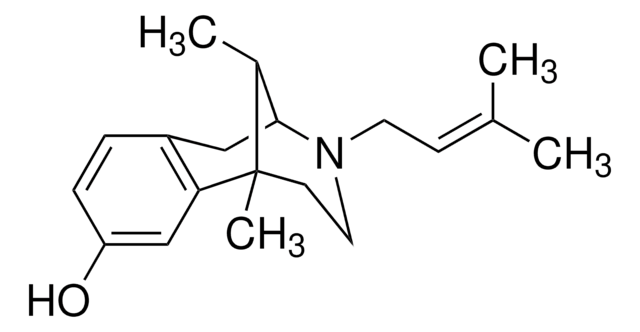Recommended Products
form
solid
optical activity
[α]23/D +134.6°, c = 1 in chloroform(lit.)
drug control
USDEA Schedule IV; Home Office Schedule 3; stupéfiant (France); kontrollierte Droge in Deutschland; regulated under CDSA - not available from Sigma-Aldrich Canada; psicótropo (Spain); Decreto Lei 15/93: Tabela IIC (Portugal)
color
white
originator
Sanofi Aventis
SMILES string
[H][C@@]12Cc3ccc(O)cc3[C@@](C)(CCN1C\C=C(\C)C)[C@@H]2C
InChI
1S/C19H27NO/c1-13(2)7-9-20-10-8-19(4)14(3)18(20)11-15-5-6-16(21)12-17(15)19/h5-7,12,14,18,21H,8-11H2,1-4H3/t14-,18+,19+/m1/s1
InChI key
VOKSWYLNZZRQPF-CCKFTAQKSA-N
Gene Information
human ... EBP(10682)
rat ... Chrm1(25229) , Chrm2(81645) , Drd2(24318) , Oprm1(25601)
Biochem/physiol Actions
Features and Benefits
Caution
Reconstitution
signalword
Warning
hcodes
Hazard Classifications
Acute Tox. 4 Dermal - Acute Tox. 4 Inhalation - Acute Tox. 4 Oral
Storage Class
11 - Combustible Solids
wgk_germany
WGK 3
flash_point_f
Not applicable
flash_point_c
Not applicable
ppe
dust mask type N95 (US), Eyeshields, Gloves
Certificates of Analysis (COA)
Search for Certificates of Analysis (COA) by entering the products Lot/Batch Number. Lot and Batch Numbers can be found on a product’s label following the words ‘Lot’ or ‘Batch’.
Already Own This Product?
Find documentation for the products that you have recently purchased in the Document Library.
Our team of scientists has experience in all areas of research including Life Science, Material Science, Chemical Synthesis, Chromatography, Analytical and many others.
Contact Technical Service








